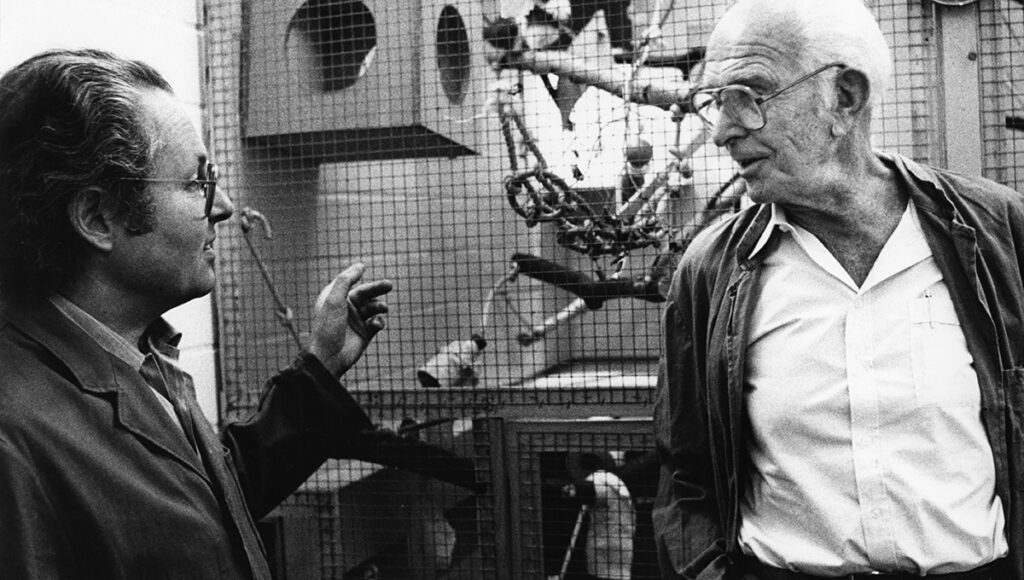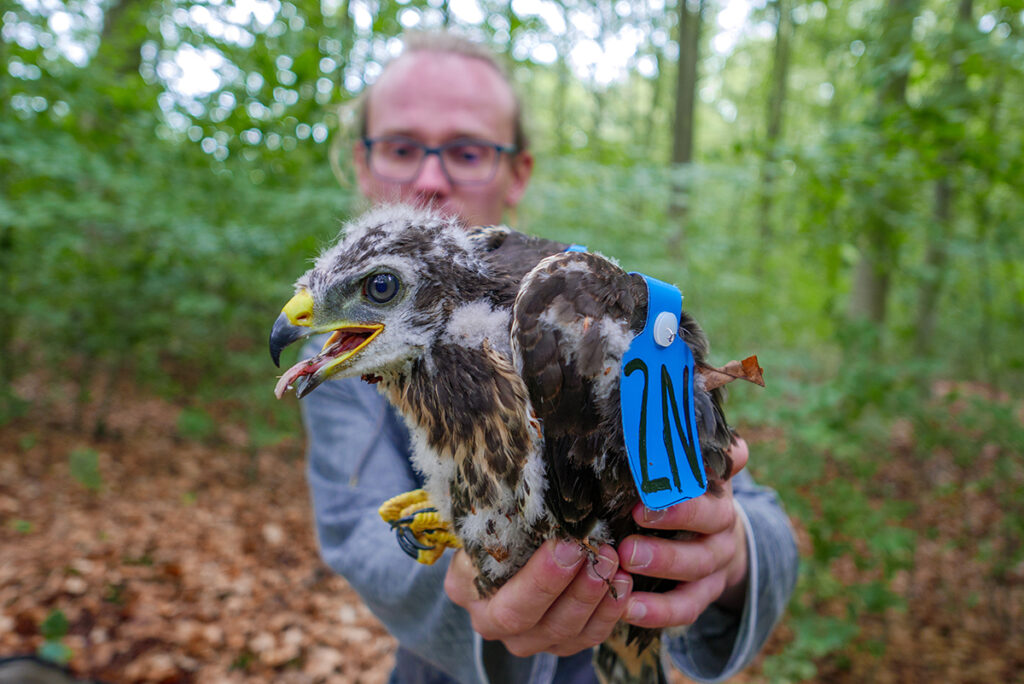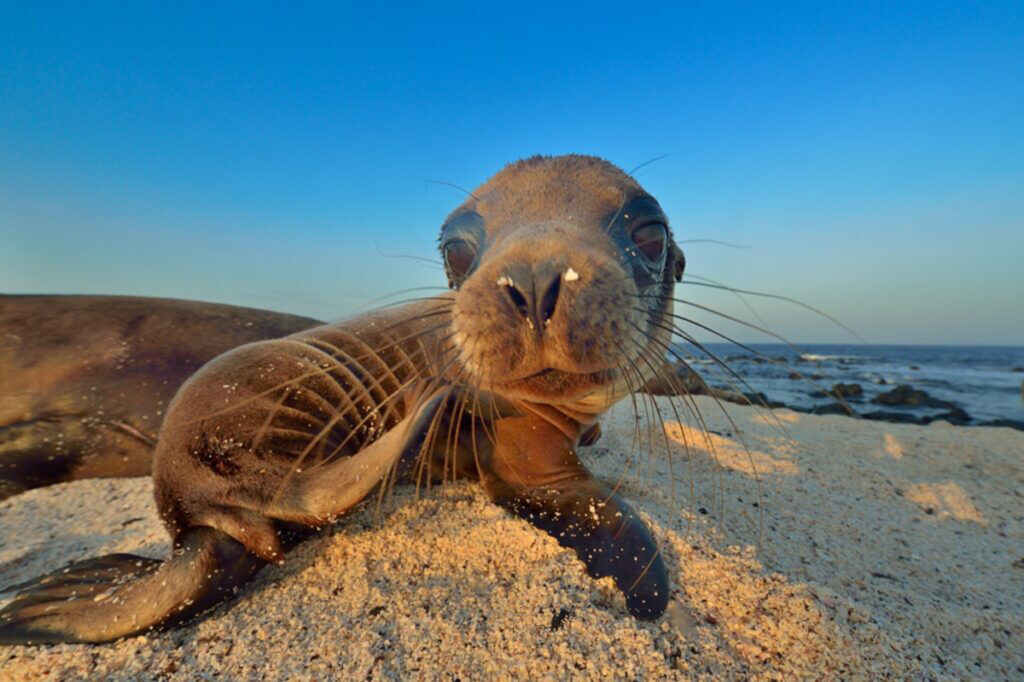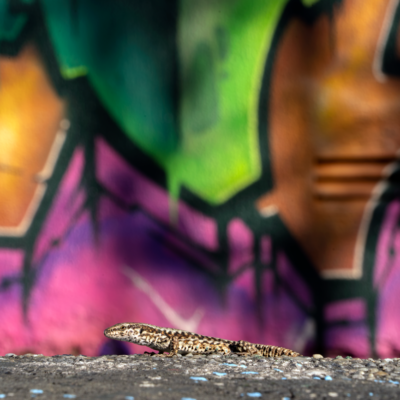When was founded during the winter semester of 1973–74, the Department of Animal Behaviour at Bielefeld University was the first of its kind in Germany. During the past 50 years, the researchers’ focus has shifted – from observing the behaviour of an entire species towards considering the particular behaviour of an individual animal. Similarly, the department’s work during this time has also shifted – from early, pioneering studies to cutting-edge international research.
When was founded during the winter semester of 1973–74, the Department of Animal Behaviour at Bielefeld University was the first of its kind in Germany. During the past 50 years, the researchers’ focus has shifted – from observing the behaviour of an entire species towards considering the particular behaviour of an individual animal. Similarly, the department’s work during this time has also shifted – from early, pioneering studies to cutting-edge international research.

© Michael Adamski
‘It was Klaus Immelmann who, with his appointment as professor in 1973, undertook the work of setting up the behavioural research building and equipping it with the necessary animal housing facilities,’ says Professor Dr. Oliver Krüger, who today heads the Department of Animal Behaviour in the Faculty of Biology. It was primarily zebra finches that were bred for research purposes.
Under the leadership of Professor Dr. Klaus Immelmann, the Department of Animal Behaviour quickly developed into a leading international centre for behavioural research. ‘Initial research questions focused on classic ethological and neuroethological issues, including sexual imprinting and animal navigation,’ says Oliver Krüger. Ethology is the biological study of animal behaviour, while neuroethology includes the study of nerve cell activity in biological investigations of behaviour.
It’s like a sickness of scientists.
I can’t stop to be curious and motivated in finding out new things.
And it’s really like observing animals and finding out
why are they doing what we see them doing.
It is actually a historic building, although it doesn’t look like it.
It is the first department of animal behavior at any university in Germany.
It was founded on the 1st of November 1973,
and the first chair, Klaus Immelmann, made the department quite famous.
And hence, I believe this is indeed a historic place
and it is a wonderful place to work in because of the people who actually work here.
We study different facets of animal behavior
and we use different techniques, for example, machine learning,
but also molecular techniques to understand certain aspects of behavior.
And of course, in the long run, we hope to understand better
what is causing individual differences in behavior.
But we are also open
to all the new aspects that are hopefully coming in the future.
Behavior of animals is quite diverse,
and that’s why the research on this topic is also quite diverse.
We work with milligram heavy insects
and we see elephants that almost weigh a ton.
And as different as those animals are, are the behaviors we look at.
We do have such a variety of model systems.
In the lab we work with zebra finches and other estrildid finches.
Outside the university building,
There are the birds of prey.
So we work with goshawks, buzzards, eagle owls.
Even further afield we have long term field studies on Galapagos sea lions.
There is a long term project on Madagascar on different species of plovers.
So I think it’s the breadth and variety of model system
that really characterizes our approach to animal behavior.
For example, in the fire salamander research, where we are actually
currently looking at how much are these individuals moving in
their habitat and is there a difference between males and females?
Is there a difference between different individuals?
And in the long run, we really hope to understand
what is causing these differences.
In our department there is over 50 people.
So it’s a quite big department.
And in conjunction with Barbara Caspers and Klaus Reinhold,
there’s almost 90 people here studying all kinds of aspects
of the behavior ecology and evolutionary ecology
of a whole range of organisms, from insects to mammals and birds.
And I think that also makes this department unique,
that we have such a kind of big force of people interested in let’s say:
The over realm of animal behavior.
Whenever I tell anybody else that we help each other with money,
with space, with instruments, they usually have never heard of that.
And this is really perfectly done here in this building.
So there are many possibilities that people meet, chat often about science
or even work together from different groups,
and it doesn’t matter from which group they are.
We have an international team of scientists here
that have very different questions and that focus on different
animal species as well as different questions.
And that is something that is so inspiring on a daily routine
that I think there is no better place to work.
Immelmann-Lecture commemorates the founder of behavioural research in Bielefeld
Klaus Immelmann organised both the International Ethology Congress (1977) as well as the one-year research programme at the Center for Interdisciplinary Research (ZiF), both of which propelled Bielefeld University to the forefront of national and international research on animal behaviour. To honour the legacy of the first professor of animal behaviour at Bielefeld University, Fritz Trillmich founded the Immelmann Lecture in 2001. Every year in November or December, a prominent researcher is invited to deliver a lecture. In 2023, the Immelmann Lecture was held by the zoologist Professor Dr. Norbert Sachster, of the University of Münster, Germany.
A team of 50+ animal behaviour researchers
In 1990, Professor Dr. Fritz Trillmich assumed departmental leadership and brought the topic of behavioural ecology to the fore. Trillmich chaired the department for nearly 25 years, and in 2013, the mantle passed to Oliver Krüger. Evolutionary geneticist Professor Dr. Joseph Hoffman is also a member of the department. Another working group on evolutionary biology, headed by Professor Dr. Klaus Reinhold, investigates how the genetic make-up of individuals and populations influences how they adapt to their environment. Since 2020, behavioural research at Bielefeld has been complemented by a separate Department of Behavioural Ecology, which is headed by Professor Dr. Barbara Caspers.
Today, more than 50 researchers at Bielefeld University are dedicated to behavioural research. They investigate animal behaviour in the laboratory and in the field, drawing on Nikolaas Tinbergen’s theory of four-questions. Bielefeld is currently well known for its laboratory studies on zebra finches and wild guinea pigs as well as its long-term field studies on birds of prey, including the buzzard and the goshawk, and field studies on seal species like the Galapagos sea lion and the Antarctic fur seal.
Bielefeld animal behavioural researchers work with colleagues around the globe. The prestige that Bielefeld research commands was recently clear for all to see, as the Behaviour 2023 conference was chosen to be held at Bielefeld University. This leading international conference on animal behaviour brought together 800 participants, including top scientists from all disciplines of behavioural research – from ethology and behavioural genetics to anthropology.
Research collaboration with colleagues from the University of Münster
‘A current problem in behavioural biology is the profound differences between individual animals,’ explains Krüger. ‘This also includes the finding that individual traits can be stable over time and across different contexts. These findings have contributed to the notion of animal personalities.’ Bielefeld researchers have been addressing these issues since 2018 in the Collaborative Research Centre ‘A Novel Synthesis of Individualisation across Behaviour, Ecology and Evolution: Niche Choice, Niche Conformance, Niche Construction (NC³)’ (CRC/TRR 212). This joint research collective is operated by both the universities of Bielefeld and Münster.
Scientists from both universities have also been investigating the role of individualisation against the backdrop of changing environmental conditions as part of ‘JICE,’ which stands for ‘Joint Institute for Individualisation in a Changing Environment.’ JICE, in turn, comprises the basis for the research association ‘Individualisation in Changing Environments’ (InChangE) founded in 2021, where researchers combine methods and knowledge from the natural sciences, humanities, and social sciences in order to systematically and experimentally investigate the phenomenon of individualisation. The research is funded by the Ministry of Culture and Science of the State of North Rhine-Westphalia.
A new research initiative at both Bielefeld and Münster universities seeks to investigate the nature of the science of individualisation. Under the name of ‘SOFI,’ the universities are currently applying for Cluster of Excellence funding as part of the Excellence Strategy of the German federal and state governments.











